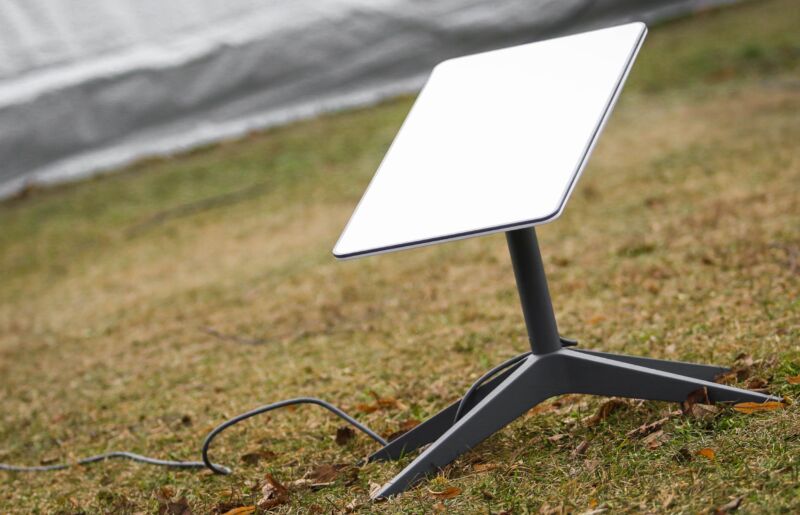Starlink has abandoned plans to charge data overage fees to standard residential users who exceed 1TB of monthly usage.
When SpaceX's Starlink division first announced the data cap in November 2022, it said that residential customers would get 1TB of "priority access data" each month. After using 1TB, customers could keep accessing the Internet at slower (but unspecified) speeds or pay $0.25 per gigabyte for "additional priority access."
This was originally supposed to take effect in December, but Starlink delayed the change to February and then to April. But now, Starlink's list of support FAQs no longer mentions the residential data cap and the current version of the fair use policy says that standard service plan users have unlimited data. The previous version of the Starlink fair use policy described the 1TB residential cap and optional $0.25-per-gigabyte overage fees.
Starlink sent an email to users that said, "Good news! Your Starlink subscription will remain unlimited and will no longer be deprioritized after 1TB of data use." Nathan Owens, a Netflix engineer who frequently tweets about Starlink, posted a screenshot of the email yesterday.
Starlink speeds have gotten slower
While eliminating data overage fees is a significant change, service to residential users will still be slower than speeds offered on Starlink's pricier plans geared toward businesses and "high-demand" users. What Starlink used to call residential and business plans are now described as "standard" and "priority."
So what's the exact difference between standard and priority data speeds? In a specifications sheet, Starlink says that standard users can expect download speeds during peak usage hours to range from 25Mbps to 100Mbps. Priority users can expect 40Mbps to 220Mbps download speeds.
For uploads, standard users can expect 5Mbps to 10Mbps during peak usage hours. Priority users would get 8Mbps to 25Mbps uploads. Expected latency is 25ms to 50ms for both standard and priority users.
Speeds have dropped as Starlink attracts more users. As recently as late September, Starlink said that residential users should expect download speeds of 50Mbps to 200Mbps, upload speeds of 10Mbps to 20Mbps, and latency of 20 to 40 ms. Business service at the time was said to offer 100Mbps to 350Mbps downloads and 10Mbps to 40Mbps uploads. The expected speeds were lowered by early November, Internet Archive captures show.
As one Starlink user wrote on Reddit, "It's not exactly a win. They're only promising 25-100Mbps for residential now. I've noticed some pretty significant speed issues lately, so I think this has been implemented before it was announced."
The now-abandoned plan for a 1TB cap would have had a carveout between the hours of 11 pm to 7 am, letting customers use unlimited data overnight while counting all other usage toward the monthly limit.
Priority costs at least $250/month, up to $2,500 upfront
In addition to a one-time $599 hardware fee, Starlink's standard plans cost $120 a month in "limited-capacity" areas and $90 a month in "excess-capacity" areas.
The priority plans for businesses and other high-demand users start at $250 a month for 1TB of the highest-speed data. The monthly prices are $500 for 2TB and $1,500 for 6TB. The recommended hardware for priority users costs $2,500.
Priority plan customers who exceed their monthly cap and don't pay for extra priority data would get the same speeds allocated to residential users ("standard data") for the rest of the month. Country-specific pricing for extra priority data is available here. It's $0.50 per gigabyte in the US.
Certain users may want to upgrade
Starlink's fair use policy says that priority plans "are designed for high demand users, such as those with business, government or institutional needs. Priority data is given network precedence over Standard and Mobile data, meaning users will experience faster and more consistent download and upload speeds."
Standard plan customers, who are most likely to be residential Internet users, should upgrade to priority plans in some cases, SpaceX also says. Like many ISPs, Starlink has a rule that says using a large but unspecified amount of data could cause the company to reduce a residential customer's speeds:
Starlink seeks to distribute Standard data among our users in a fair and equitable manner. If bandwidth patterns consistently exceed what is allocated to a typical residential user, Starlink may take network management measures, such as temporarily reducing a customer's speeds, to prevent or mitigate congestion of the Services. Bandwidth intensive applications, such as streaming videos, gaming, or downloading large files are most likely to be impacted by such actions. Standard Service Plan customers with high bandwidth needs should consider upgrading to a Priority Service Plan.
In addition to standard and priority plans, Starlink is offering a mobile plan for portable use, such as with RVs, and a "mobile priority" plan for maritime, in-motion, and other high-demand mobile use cases.



3175x175(CURRENT).thumb.jpg.b05acc060982b36f5891ba728e6d953c.jpg)
Recommended Comments
There are no comments to display.
Join the conversation
You can post now and register later. If you have an account, sign in now to post with your account.
Note: Your post will require moderator approval before it will be visible.